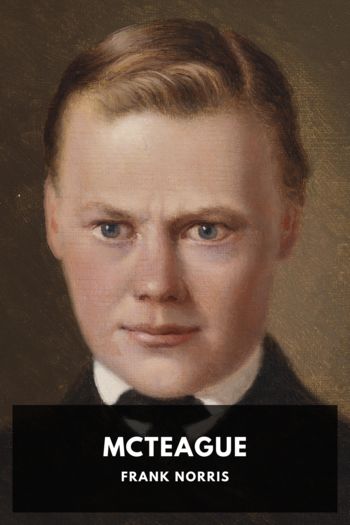McTeague, Frank Norris [polar express read aloud .txt] 📗

- Author: Frank Norris
Book online «McTeague, Frank Norris [polar express read aloud .txt] 📗». Author Frank Norris
“Lord! what a country!” exclaimed the dentist.
An hour later, the mule stopped and lay down, his jaws wide open, his ears dangling. McTeague washed his mouth with a handful of water and for a second time since sunrise wetted the flour-sacks around the bird cage. The air was quivering and palpitating like that in the stokehold of a steamship. The sun, small and contracted, swam molten overhead.
“I can’t stand it,” said McTeague at length. “I’ll have to stop and make some kinda shade.”
The mule was crouched upon the ground, panting rapidly, with half-closed eyes. The dentist removed the saddle, and unrolling his blanket, propped it up as best he could between him and the sun. As he stooped down to crawl beneath it, his palm touched the ground. He snatched it away with a cry of pain. The surface alkali was oven-hot; he was obliged to scoop out a trench in it before he dared to lie down.
By degrees the dentist began to doze. He had had little or no sleep the night before, and the hurry of his flight under the blazing sun had exhausted him. But his rest was broken; between waking and sleeping, all manner of troublous images galloped through his brain. He thought he was back in the Panamint hills again with Cribbens. They had just discovered the mine and were returning toward camp. McTeague saw himself as another man, striding along over the sand and sagebrush. At once he saw himself stop and wheel sharply about, peering back suspiciously. There was something behind him; something was following him. He looked, as it were, over the shoulder of this other McTeague, and saw down there, in the half light of the canyon, something dark crawling upon the ground, an indistinct gray figure, man or brute, he did not know. Then he saw another, and another; then another. A score of black, crawling objects were following him, crawling from bush to bush, converging upon him. “They” were after him, were closing in upon him, were within touch of his hand, were at his feet—were at his throat.
McTeague jumped up with a shout, oversetting the blanket. There was nothing in sight. For miles around, the alkali was empty, solitary, quivering and shimmering under the pelting fire of the afternoon’s sun.
But once more the spur bit into his body, goading him on. There was to be no rest, no going back, no pause, no stop. Hurry, hurry, hurry on. The brute that in him slept so close to the surface was alive and alert, and tugging to be gone. There was no resisting that instinct. The brute felt an enemy, scented the trackers, clamored and struggled and fought, and would not be gainsaid.
“I can’t go on,” groaned McTeague, his eyes sweeping the horizon behind him, “I’m beat out. I’m dog tired. I ain’t slept any for two nights.” But for all that he roused himself again, saddled the mule, scarcely less exhausted than himself, and pushed on once more over the scorching alkali and under the blazing sun.
From that time on the fear never left him, the spur never ceased to bite, the instinct that goaded him to fight never was dumb; hurry or halt, it was all the same. On he went, straight on, chasing the receding horizon; flagellated with heat; tortured with thirst; crouching over; looking furtively behind, and at times reaching his hand forward, the fingers prehensile, grasping, as it were, toward the horizon, that always fled before him.
The sun set upon the third day of McTeague’s flight, night came on, the stars burned slowly into the cool dark purple of the sky. The gigantic sink of white alkali glowed like snow. McTeague, now far into the desert, held steadily on, swinging forward with great strides. His enormous strength held him doggedly to his work. Sullenly, with his huge jaws gripping stolidly together, he pushed on. At midnight he stopped.
“Now,” he growled, with a certain desperate defiance, as though he expected to be heard, “now, I’m going to lay up and get some sleep. You can come or not.”
He cleared away the hot surface alkali, spread out his blanket, and slept until the next day’s heat aroused him. His water was so low that he dared not make coffee now, and so breakfasted without it. Until ten o’clock he tramped forward, then camped again in the shade of one of the rare rock ledges, and “lay up” during the heat of the day. By five o’clock he was once more on the march.
He travelled on for the greater part of that night, stopping only once towards three in the morning to water the mule from the canteen. Again the red-hot day burned up over the horizon. Even at six o’clock it was hot.
“It’s going to be worse than ever today,” he groaned. “I wish I could find another rock to camp by. Ain’t I ever going to get out of this place?”
There was no change in the character of the desert. Always the same measureless leagues of white-hot alkali stretched away toward the horizon on every hand. Here and there the flat, dazzling surface of the desert broke and raised into long low mounds, from the summit of which McTeague could look for miles and miles over its horrible desolation. No shade was in sight. Not a rock, not a stone broke the monotony of the ground. Again and again he ascended the low unevennesses, looking and searching for a camping place, shading his eyes from the glitter of sand and sky.
He tramped forward a little farther, then paused at length in a hollow between two breaks, resolving to make camp there.
Suddenly there was a shout.
“Hands up. By





Comments (0)